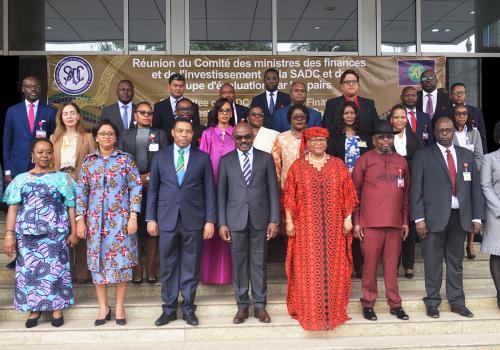The Southern Africa Development Community (SADC) Ministers of Finance and Investment and Governors of Central Banks has called for increased financial investment and portfolio diversification to achieve economic stability, stimulate growth and build economic resilience in the region.
The Ministers and Governor’s met in Kinshasa, Democratic Republic of Congo, on 20 July 2023 to reviewprogress made by Member States towards implementing the SADC Macroeconomic Convergence Programme and recommendations of their previous meetings which include structural and policy reforms. The Ministers also discussed the risks and opportunities to the region’s economic outlook and devised policy measures to mitigate the risks.
Honourable, Nicolas Kazadi Kadima-Nzuji, Minister of Finance of the Democratic Republic of Congo and Chairperson of the Committee of Ministers of Finance and Investment and Central Bank Governors urged the meeting to reaffirm fundamental economic principles for development in each SADC Member State.
In support of the implementation of the SADC Protocol on Finance and Investment, Honourable Kadima-Nzuji emphasised that, for SADC to attract investment capital, Member States must adopt prudent policy frameworks, promote harmonisation of financial and investment policies, enhance government efficiency and implement long-term financial regulations.
He highlighted a number of challenges that the region is confronted with including; high inflation, Russia-Ukraine conflict, constrained fuel, fertilizer and food supply; effects of climate change, sluggish economic growth, and increasing debt burden which has become unsustainable, stating that these factors have contributed to widespread distress and under-investment resulting into increasing poverty and hunger,currency depreciation and higher interest rates.
Moreover, he stated that the COVID-19 pandemic is one of the catastrophes that has prompted remarkable legislative actions to mitigate global extreme challenges, such as the rise in the poverty rate from 8.4% to 9.3%, which has made SADC Member States become vulnerable to domestic crises and external debt.
Ms. Angèle Makombo N'Tumba, SADC Deputy Executive Secretary for Regional Integration, who represented the SADC Executive Secretary, His Excellency Mr. Elias Magosi commended the region for tremendous achievements in strengthening the financial sector, through the establishment of a functional regional cross-border payment system; financial inclusion and harmonisation of regulatory frameworks as part of the consolidation of the SADC Free Trade Area, and as a pre requisite for the establishment of a monetary union.
Ms. N'Tumba highlighted the importance of harmonising policies and improving the investment and business environment to achieve the microeconomic convergence, urging Member States to continue implementing essential frameworks, policies and recommendations.
She also emphasised the significance of the Regional Development Fund in mobilising resources to finance the development of climate-smart infrastructure and technologies that increase agricultural production and industrial productivity and enhance intra-regional trade.
Amongst other issues, the Ministers and Governors of Central Banks deliberated on following;
the SADC Regional Development Fund (RDF) which aims to create a regional financing mechanism for economic development and sustainable growth through infrastructure development; industrial development; integration and economic adjustment; and social development.
the SADC financing mechanisms to sustainably support regional infrastructure development and industrial initiatives as a means of financing economic development and sustainable growth.
implementation plan and roadmap including the development of the instruments required for the establishment of the Regional Transmission Infrastructure Financing Facility.
the SADC Protocol on Finance and Investment Roadmap for deeper financial and investment integration with key milestones to anchor the future work programme of the Ministers of Finance and Investment in the light of new demands of industrialisation and deeper regional integration as well as review progress on the implementation of the Strategic Focus Areas of the Committee of Central Bank Governors in the SADC region.
the progress report of the SADC Project Preparation Development Facility (SADC PPDF), which is supported by KfW Bank of Germany to the tune of USD20,2 million for the preparation of 12 regional projects in the energy, transport, and water sectors with the objective of promoting sustainable economic growth and the delivery of key services affecting the development of the SADC region.
the progress on implementation of the Financial Action Task Force (FATF) recommendations to address identified Anti-Money Laundering deficiencies and Countering Financing of Terrorist(AML/CFT).
the operationalistion of SADC Committee on Anti-Money Laundering (AML) in line with Annex 12 of the Protocol on Finance and Investment.
the free and fair trade in the context of the African Continental Free Trade Area (AfCFTA) to promote efficiency and opportunity for growth and convergence.
approval of the new SADC Strategy on Financial Inclusion and Small and midsize enterprises (SMEs) Access to Finance (2023-2028) which envisages an inclusive, stable, and innovative SADC financial system that empowers individuals and businesses to access and use quality financial services, in order to contribute to industrialisation, inclusive growth, and resilient, sustainable economic well-being.
noted the $8.93 billion replenishment package from development partners of the African Development Fund (ADF) for the ADF-16 cycle, covering 2023-2025, to address Africa's multiple development needs, including COVID-19 pandemic recovery, climate change, fragility, debt, and economic vulnerabilities.
The meeting was attended by Ministers and Governors from Central Banks or their representatives from Angola, Botswana, Democratic Republic of Congo, Eswatini, Lesotho, Madagascar, Malawi, Mozambique, Namibia, South Africa, United Republic of Tanzania, Zambia and Zimbabwe.
The mandate of the SADC Committee of Ministers of Finance and Investment and Peer Review Panel is to oversee the monetary, financial markets, investment, and infrastructure integration that are central to the SADC Integration Agenda. This is a requirement under the Protocol on Finance and Investment, which directs the Ministers responsible for Finance and Investment, and the Central Bank Governors to meet annually to review progress and provide guidance to the SADC Council of Ministers regarding monetary, financial markets, investment, and infrastructure integration.

